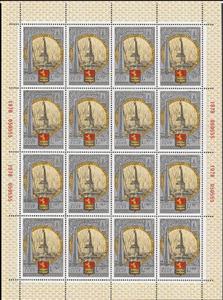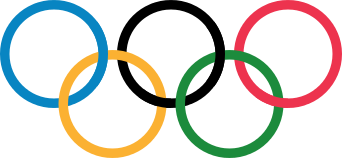Full Pane: Peter the Great Monument, Pereslavl-Zalessky (Lion & Fish) (Soviet Union, USSR 1978)
Peter the Great Monument, Pereslavl-Zalessky (Lion & Fish) (Soviet Union, USSR 1978)
25 December (Soviet Union, USSR ) within release Summer Olympic Games 1980 - Moscow (VIII) Tourism (III) goes into circulation Full Pane Peter the Great Monument, Pereslavl-Zalessky (Lion & Fish) face value 16*(1+0.50) Russian ruble
| Full Pane Peter the Great Monument, Pereslavl-Zalessky (Lion & Fish) in catalogues | |
|---|---|
| Unificato: | Un: SU 4567MF |
Full Pane is square format.
Also in the issue Summer Olympic Games 1980 - Moscow (VIII) Tourism (III):
- Full Pane - A. Nevsky and WWII Soldiers' Monuments, Pereslavl-Zalessky face value 16*(1+0.50);
- Full Pane - Dock and Monument for Soviet Heroes, Yaroslavl (Bear) face value 16*(1+0.50);
- Full Pane - Peter the Great Monument, Pereslavl-Zalessky (Lion & Fish) face value 16*(1+0.50);
Full Pane Peter the Great Monument, Pereslavl-Zalessky (Lion & Fish) it reflects the thematic directions:
A coat of arms is an heraldic visual design on an escutcheon (i.e. shield), surcoat, or tabard. The coat of arms on an escutcheon forms the central element of the full heraldic achievement which in its whole consists of shield, supporters, crest, and motto. A coat of arms is traditionally unique to an individual person, family (except in the United Kingdom), state, organisation or corporation.
The modern Olympic Games or Olympics (French: Jeux olympiques) are leading international sporting events featuring summer and winter sports competitions in which thousands of athletes from around the world participate in a variety of competitions. The Olympic Games are considered the world's foremost sports competition with more than 200 nations participating. The Olympic Games are held every four years, with the Summer and Winter Games alternating by occurring every four years but two years apart.
Tourism is travel for pleasure or business; also the theory and practice of touring, the business of attracting, accommodating, and entertaining tourists, and the business of operating tours. Tourism may be international, or within the traveller's country. The World Tourism Organization defines tourism more generally, in terms which go "beyond the common perception of tourism as being limited to holiday activity only", as people "traveling to and staying in places outside their usual environment for not more than one consecutive year for leisure, business and other purposes". Tourism can be domestic or international, and international tourism has both incoming and outgoing implications on a country's balance of payments. Today, tourism is a major source of income for many countries, and affects the economy of both the source and host countries, in some cases being of vital importance.



